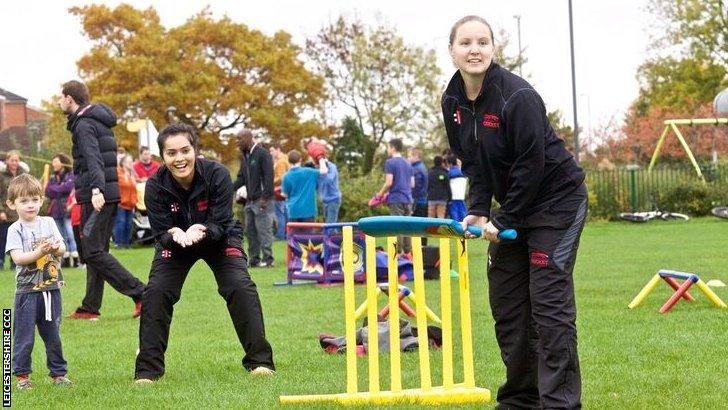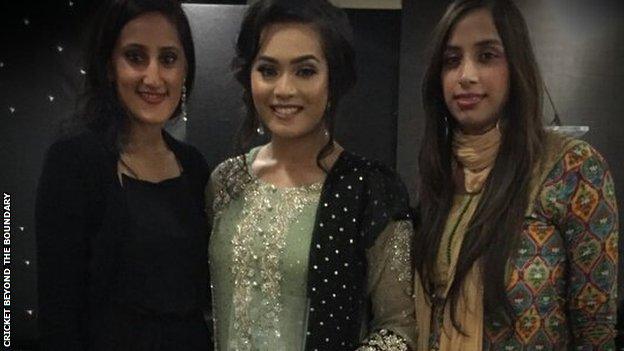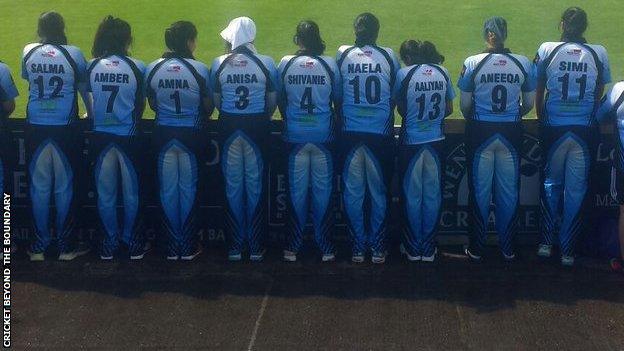Amna Rafiq on breaking down cricket and cultural boundaries for women
- Published

Wicketkeeper Amna Rafiq takes part in a community cricket match
Amna Rafiq was lucky, born into a cricket-mad family where both she and older brother Azeem were treated equally by their family.
But when it came to playing the game it was a different story. There were no girls teams in Barnsley so she had to play with the boys.
"I was the only girl playing in a boys' team," Rafiq, Leicestershire's award-winning community development officer, told BBC Sport.
"My dad took me everywhere and he found it difficult - a changing room full of 10 other boys, male coaches and me.
"I did used to get looked down upon, which worked in my favour because people would think 'oh, she's just going to bowl slow, let's try and whack her out'."
Rafiq did not want other girls "to face what I had faced" so at the age of 13 she started coaching via Yorkshire's Young Leadership Academy - again, the sole girl on the course.
But her determination, and the continued support from her family and Barnsley Cricket Club, did lead to the formation of a girls team for which she is very proud.
Brother Azeem went on to become Yorkshire's youngest ever captain, when he led the side in a Twenty20 game in 2012.
Amna also continued playing cricket but decided her main passion was to help other girls get into the game - particularly those whose cultural backgrounds make it difficult for them to play sport.
At the age of 20, Rafiq's community work has earned her the Behind the Scenes Award at the Asian Cricket Awards.
"One of the special works I did was in a Muslim high school in Leicester," she said. "We ran a six-week coaching programme there to girls who had never played cricket in their lives."
At first a handful of girls attended but by the end of the course 22 had taken part.
"Now those girls absolutely love cricket," she added.
A study found that only 7% of the cricket-playing population are female, external and while the sport is a popular among Asian males, girls are not always encouraged to play.
Salma Bi was one of the few to break down barriers and became the first South Asian female to play for Worcestershire. But despite coming from a sporty family, she experienced similar issues convincing her parents that cricket was worth her time.
"It was quite difficult for them. They were saying 'you play at school, why do you have to play for a club?'" she said.

Amna Rafiq (centre) was the recipient of an Asian Cricket Award for her work in providing opportunities to young girls in cricket that she did not have
It was not until she started putting medals and trophies on the mantelpiece that her ambitions were taken more seriously. With little support, she learned to bowl watching Shane Warne on television and earned herself the nickname 'the queen of spin.'
Through her Sporting Pathways organisation, Bi looks to get more young girls in to sport but admits it can still be a struggle to sway reticent parents.
"It's difficult with Asian girls. A few girls that I thought were very talented; again their families didn't want them to take part in any clubs."
Bi often uses herself as an example of the potential future that awaits their daughters if they continue to play, something Rafiq sees as a huge step in convincing others from the same background that girls can play cricket.
"Generally across South Asian parents it's a battle I've had to face with the girls in Leicester as well."
"If you've got the people up there that are Asian especially promoting cricket to the girls and their parents can see that, it's obviously going to increase participation."
Both recently played in a charity match dubbed 'bowling out domestic abuse' at Headingley, the home of Yorkshire, against a combined forces side where they formed part of the UK's first all-Asian women's T20 side.

The UK's first all-Asian women's T20 team
Journalist Mohammed Ansar became an advocate for the women's game after introducing his daughters to the sport. Both his daughters took part in the match and he feels attitudes to women's cricket are slowly changing.
"For Asian girls the stereotype around sport can be true; how can you be modest and so on. But the mentality is changing," he said.
"Cricket is in a fantastic position to reach out to a community that is at times marginalised and disenfranchised.
With the introduction of the Super League this year and the ICC Women's Cricket World Cup on home soil next summer, interest in the women's game will be at an all-time high. But at grassroots level, Rafiq knows the work she does is still appreciated.
"I didn't have that female Asian role model. I was never sure if I was doing the right thing or should I have gone and done what my parents wanted. I 100% know that I've done the right thing and I'm so happy in what I do," she said.
"I got a three-page letter from some of the girls which was the sweetest thing ever. They appreciate me so much, it's actually cute."
- Published15 May 2018

- Published18 October 2019

- Published8 August 2017

- Published13 May 2016

- Published10 March 2019
